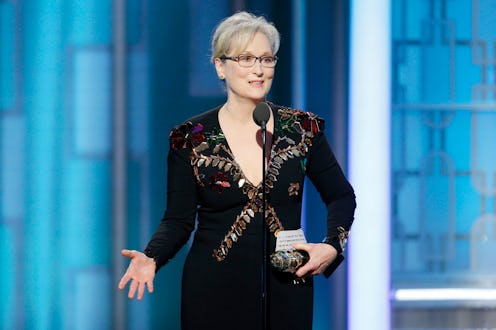Entertainment
Meryl Streep's Speech Carries Political Weight

You knew President-elect Donald Trump was going to say something about it. The minute she hinted at him during her speech, even I began to tense up. Is that we've come to expect now when someone speaks out against the President-elect? Meryl Streep's Golden Globes speech for her Cecil B. Demille Lifetime Achievement Award shook the house on Sunday night. Streep impressed upon her listeners the need for press accountability and a united front against the impeding divisiveness of the Trump administration. There was a backlash, naturally, to her speech.
On Twitter, Trump labeled Streep a "Hillary flunky," rhetorically implying she was bitter over Clinton's loss. "Meryl Streep, one of the most overrated actresses in Hollywood, doesn't know me but attacked last night at the Golden Globes," Trump tweeted. And so a debate broke out on Twitter about why "elite Hollywood liberals" don't get to have an opinion about the common problems of regular Americans.
Streep's speech, as the reaction to it indicates, managed to cut to the core of a pressing problem currently taking hold in America: Who gets to speak out against perceived political ills? If the common foundation of American citizenship — simple in its conceit yet somehow, oddly complicated in practice — cannot allow for a woman to speak her mind, that what does give her the privilege to speak?
Because that is all Streep is. Yes, she is an actor, but she is first and foremost an American citizen. That's what matters in discussing the question of whether she, a famous person, has any privilege to speak politically. The answer: of course she does. She said it herself last night: "I was born and raised and educated in the public schools in New Jersey." Streep is afforded the First Amendment right to free speech. She had every right to criticize the President-elect and she illustrated why it is important to speak up when you believe something wrong is happening that needs to be acknowledged. Her actions are proof that the term "Hollywood liberal" is based in rhetorical fallacy because it ignores that fact that she is an American citizen first and as such, has the right to address her fellow Americans — and those non-Americans who are listening — when she feels the need to do so.
She also followed in a long line of Hollywood folk who have used the Golden Globes stage as a political platform in the past. It is neither new nor radical that Streep took her time to call out Trump's abhorrent behavior during the election cycle. At the 1978 Oscars, Vanessa Redgrave spoke out against anti-Semitism and Fascism, two subjects as real in 1978 as they were in the film which earned her an award, Julia. Awards stages have always presented the chance to commingle the personal and the political, in part because the national broadcasting of these shows provides ample opportunity to spread a message and because famous persons are offered a single chance to speak uninhibited.
The opposition's rhetoric in the hours since Streep spoke has tried to depict Streep as an out-of-touch celebrity with no position to support the everyman because of wealth and fame; this, in short, is beyond the pale. Even some celebrities have spoken out against Streep, like country singer Travis Tritt, who wrote on his Twitter:
Advice to all actors, musicians and entertainers: Please stick to your crafts that we all love you for and drop the political rhetoric. Nobody cares or wants to hear what any celebrities have to say about politics. Do your craft and leave politics to the politicians.
Silencing is a way to divide and demean. It is also a part of this rhetorical strategy to imply that Hollywood celebrities are entitled liberals who believe their opinions matter more than others despite their overwhelming fortunes. Doesn't that sound wild to you? What kind of rhetorical fallacy have we here?
To divide Streep (and the rest of Hollywood, by extension) from us (the people who admire and look up to them from time to time) is to force us to denigrate our fellow Americans because of our differences in socio-economic status. This achieves what the President-elect did during the election and what his future administration may do in the next four years. This is counter-intuitive to Streep's message.
Streep said it best last night: "An actor's only job is to enter the lives of people who are different from us and let you feel what that feels like." Sure, she may belong to a rarefied echelon of society I'll never ascend to, but I understand her humanity. I relate to her manifestation of the American dream. Woman to woman, I stand in awe. That's why I listen to Streep. That may be why you listen to a different celebrity (but also, c'mon, listen to Streep, too). Streep did her job last night as, yes, an actor. As an American and as an actor, she took to the stage and reached out to people who were different from her in nearly every way imaginable and she let us feel her worry and her pain. We watched, we soaked it up, and we reacted accordingly.
In my opinion, it was her best performance to date.